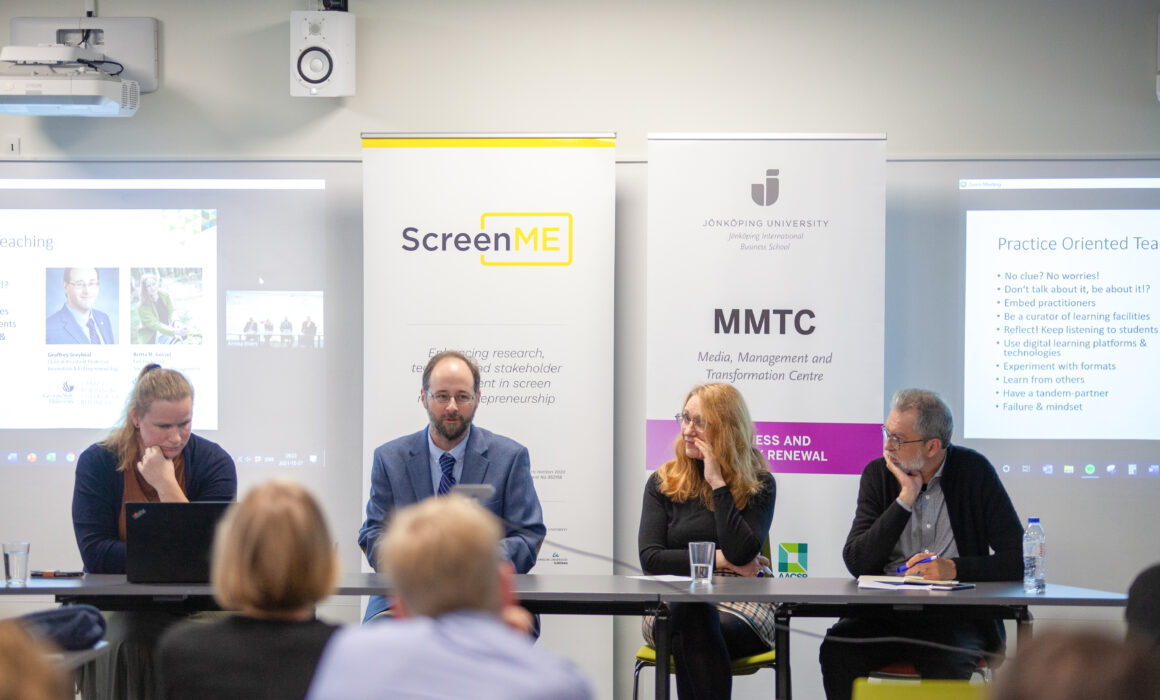Young scholars, how to develop your teaching and research skills?
A publishing strategy and research and teaching skills are crucial to thrive in the competitive academic world. But what can be advised to young scholars regarding research and teaching? How can they find their own path?
These big questions were addressed in the Doctoral Colloquium organized by the European Media Management Association (emma) and ScreenME as a preconference to the emma Conference 2021 hosted by the Media, Management and Transformation Center (MMTC), Jönköping International Business School (JIBS), Jönköping University, Sweden. The idea was not to explore in detail but to give some insights to the around 40 young scholars gathered in the hybrid event to listen to, and discuss with, a panel of experienced scholars and teachers.
The first part of the colloquium dealt with key challenges for young scholars and gathered Associate Professor Mart Ots (JIBS), Senior Assistant Professor Sven-Ove Horst (Erasmus University Rotterdam), Professor Britta Gossel (Eberswalde University) and Clinical Assistant Professor Geoffrey Graybeal (Georgia State University), in two sessions chaired by Professor Miguel Crespo (University Institute of Lisbon) and Associate Professor Päivi Maijanen-Kyläheiko (LUT University).
“Do what you enjoy, and then work on that. Publish that.” (Sven-Ove Horst)
In the colloquium, one of the key messages for the young scholars was to keep your own mind. This implies to focus on what you are passionate about and avoid going after trends. The supervisor’s support is important. Sven-Ove Horst emphasized from his own experience that he is thankful to his supervisor who believed in him and gave him freedom to explore and find his own direction. In building the career, planning your publishing strategy is an important and useful tool to go forward systematically. With publishing strategy you address your own ambitions but also what is expected by your university and possible future employers. But as emphasized in the colloquium, strategies also have an emergent character. So, don’t be stuck to your strategy, be open and ready to seize opportunities.
”Spend 90% of your time on publications that count.” (Mart Ots)
Young scholars were also advised to be ”goal oriented and to make sure you invest the most of your time and effort in those that really benefit what you want to achieve” – as emphasized by Mart Ots. As for strategies, you need to build both short-term and long-term strategies. Short-term strategy refers to what is needed for your PhD. Long-term strategies are to address such questions as what is your expertise and research field/s and what kind of publications are required to advance your career in academia.
“No clue? No worries!“
Experienced teachers Britta Gossel and Jeffrey Graybeal advised young scholars just to take it easy and not to fall into panic when facing a challenging situation. Practice-oriented teaching can be a challenge for a young scholar – or anyone! – with no real-life business experience. But as advised: “No clue? No worries”. It helps to simply understand and accept that none of us can know everything and as teachers we shouldn’t even aim for that. We are lucky that we have colleagues who help, practitioners that we can invite to the class and we have brilliant students with whom we can reflect and look for answers. As Gossel and Graybeal emphasize, the teacher is foremost the “curator of learning facilities”. We should simply take an entrepreneurial mindset and experiment with different formats and explore and exploit digital technologies. First of all, we should not be afraid of failures because from failures we learn to become better teachers!
The second part of the colloquium was devoted to a methods workshop, chaired by Preofessor Sabine Baumann (Jade University) and Senior Researcher Heritiana Ranaivoson (Vrije Universiteit Brussel). Organized around two themes (qualitative methods & quantitative methods), five experienced researchers were invited to present and discuss their respective experiences: Dr Sara Ekberg (Griffith Business School), Professor Elena Raviola (University of Gothenburg School of Business), Senior Lecturer Maria Norbäck (University of Gothenburg School of Business), Professor Helle Sjøvaag (University of Stavanger) and Associate Professor Marcel Garz (JIBS)
Unpacking the dynamics of ongoing processes
Sara Ekberg, Elena Raviola and Maria Norbäck discussed the use of ethnography and case studies in media management research. Sara Ekberg explained how she combined document analysis, interviews and observations in her approach to analyse a start-up ecosystem. Similarly, Maria Norbäck combined interviews, observations and social media communities in her study of professional media work (public service television production & freelance journalist work). An important contribution of such approach is that it allows unpacking the dynamics between actors, groups or organizations on the broader context in which they are embedded. On the other hand, it does not come without hurdles, a major one being where to set the boundaries in time and space. Such an approach also needs to be rethought in a time when most activities (notably meetings) move online, as we could observe with the COVID crisis’s lockdown episodes.
Don’t be afraid of learning new tools
Helle Sjøvaag and Marcel Garz presented their respective uses of computational and social media analytics. Marcel Garz presented the role of social media metrics in media industries, how his methodology combined web scraping, the use of the platforms’ APIs and data provided by second providers. He notably gave some useful resources to the audience. Helle Sjøvaag described her use of computational analytics, in particular social media analysis. Challenges include the fact that the object is in constant /perpetual evolution, making it very difficult to reproduce data collection approaches after a few years. Both approaches require some time investment to master the computer tools. However they enable researchers to make their analysis rely on a large set of data.


